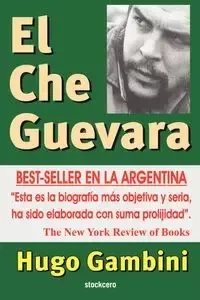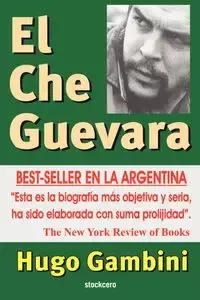El Che Guevara - Hugo Gambini
Known Che's death, opinions of all kinds were heard about his personality. From the most calculating to the most compromising. One, that of the late confessor of Eva Perón, Father Hernán Benítez, impresses with his absolute frankness: "Spending your life in the jungle, hungry ... with your head at a price and facing overwhelming warlike power ... this is heroism of law, however rash his ideas might be ... Failure to acknowledge it would be stupid "; the priest is exalted. The popular journalist author of this biography of the Argentine-Cuban revolutionary - whose first edition is from 1968 - traces in it the formative stage of childhood and the anti-Peronist feelings of adolescence; the wild adventure of touring Latin America on a motorcycle and Guevara's anti-Yankee irritability at the fall of President Arbenz of Guatemala, attributable to the White House.
The narrative follows the doctor-turned-fighter, submachine gun, and asthma in tow, during the Sierra Maestra odyssey, healing the wounded, assisting miserable peasants, and deepening Marxist readings on truces. More novel than truthful seems the triumphant entry into Havana of the ragged rebels, after Batista fled and his troops dispersed. The author documents Guevara's visit to Third World countries and his adherence to the prevailing statist system in them. Increasingly imbued with Leninist faith, indefatigable in his leadership, Che improvises Minister of Economy and, later, of Industry, once the technicians who have preceded him in both portfolios have been defeated - to accelerate revolutionary construction. The Punta del Este conference, planned by Castro's negotiating will, leads to Che's interview, in Buenos Aires, with President Frondizi, and his dismissal by a coup sector of the armed forces.
Gambini outlines, through dialogues, the differences between Guevara and Castro. While the Argentine insists on giving the new regime an ideological content - Marxism adjusted to the peculiarities from a Caribbean island - the head of the realistic political movement, enters into an alliance with the Bolshevik leaders of Soviet Russia. reciprocity of interests.
The Christian Democrat and anti-communist revolutionary hero Camilo Cienfuegos remains in the shadows and the author has preferred to leave his mysterious disappearance between doubt and suspicion. Gripped between Moscow revisionism and Maoism, the Cuban revolution loses autonomy. Che wants to take it with him, export it to Latin America, then to the world. "Let's not let the differences in the socialist field divide us," said Fidel. Gambini revives the Guevara who, to rescue the chimera of the "new man" and the "perfect society", exchanges ministries and honors for the guerrilla fighter's backpack and sinks in the forests of Bolivia.
"Your father has been a man who acts as he thinks ..., loyal to his conviction," Che says to his five children, in a farewell letter. The idealist, no doubt present in him until his last breath, was unaware that the utopia of a universal socialist homeland implied in fact a superhuman conception. Sooner or later condemned to plunge into the infra-human conditions of life in a country like the oppressed and famished Cuba of today, which launches day after day into the sea and its sharks the rafts of the fugitives.
Gambini's highly recommended biography preserves the hope that the brother country, through a process of gradual reforms, will regain its essential freedoms, without sacrificing any of the achievements achieved in the field of education, scientific research and social legislation.
EAN: 9789872050641




Known Che's death, opinions of all kinds were heard about his personality. From the most calculating to the most compromising. One, that of the late confessor of Eva Perón, Father Hernán Benítez, impresses with his absolute frankness: "Spending your life in the jungle, hungry ... with your head at a price and facing overwhelming warlike power ... this is heroism of law, however rash his ideas might be ... Failure to acknowledge it would be stupid "; the priest is exalted. The popular journalist author of this biography of the Argentine-Cuban revolutionary - whose first edition is from 1968 - traces in it the formative stage of childhood and the anti-Peronist feelings of adolescence; the wild adventure of touring Latin America on a motorcycle and Guevara's anti-Yankee irritability at the fall of President Arbenz of Guatemala, attributable to the White House.
The narrative follows the doctor-turned-fighter, submachine gun, and asthma in tow, during the Sierra Maestra odyssey, healing the wounded, assisting miserable peasants, and deepening Marxist readings on truces. More novel than truthful seems the triumphant entry into Havana of the ragged rebels, after Batista fled and his troops dispersed. The author documents Guevara's visit to Third World countries and his adherence to the prevailing statist system in them. Increasingly imbued with Leninist faith, indefatigable in his leadership, Che improvises Minister of Economy and, later, of Industry, once the technicians who have preceded him in both portfolios have been defeated - to accelerate revolutionary construction. The Punta del Este conference, planned by Castro's negotiating will, leads to Che's interview, in Buenos Aires, with President Frondizi, and his dismissal by a coup sector of the armed forces.
Gambini outlines, through dialogues, the differences between Guevara and Castro. While the Argentine insists on giving the new regime an ideological content - Marxism adjusted to the peculiarities from a Caribbean island - the head of the realistic political movement, enters into an alliance with the Bolshevik leaders of Soviet Russia. reciprocity of interests.
The Christian Democrat and anti-communist revolutionary hero Camilo Cienfuegos remains in the shadows and the author has preferred to leave his mysterious disappearance between doubt and suspicion. Gripped between Moscow revisionism and Maoism, the Cuban revolution loses autonomy. Che wants to take it with him, export it to Latin America, then to the world. "Let's not let the differences in the socialist field divide us," said Fidel. Gambini revives the Guevara who, to rescue the chimera of the "new man" and the "perfect society", exchanges ministries and honors for the guerrilla fighter's backpack and sinks in the forests of Bolivia.
"Your father has been a man who acts as he thinks ..., loyal to his conviction," Che says to his five children, in a farewell letter. The idealist, no doubt present in him until his last breath, was unaware that the utopia of a universal socialist homeland implied in fact a superhuman conception. Sooner or later condemned to plunge into the infra-human conditions of life in a country like the oppressed and famished Cuba of today, which launches day after day into the sea and its sharks the rafts of the fugitives.
Gambini's highly recommended biography preserves the hope that the brother country, through a process of gradual reforms, will regain its essential freedoms, without sacrificing any of the achievements achieved in the field of education, scientific research and social legislation.
EAN: 9789872050641

